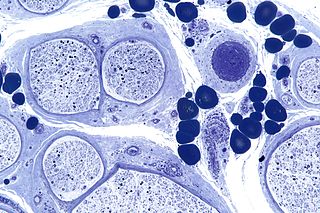| Dendrocoelopsis | |
|---|---|
| | |
| Dendrocoelopsis alaskensis | |
| Scientific classification | |
| Domain: | Eukaryota |
| Kingdom: | Animalia |
| Phylum: | Platyhelminthes |
| Order: | Tricladida |
| Family: | Dendrocoelidae |
| Genus: | Dendrocoelopsis Kenk, 1930 |
| Species | |
See text [1] | |
| Dendrocoelopsis | |
|---|---|
| | |
| Dendrocoelopsis alaskensis | |
| Scientific classification | |
| Domain: | Eukaryota |
| Kingdom: | Animalia |
| Phylum: | Platyhelminthes |
| Order: | Tricladida |
| Family: | Dendrocoelidae |
| Genus: | Dendrocoelopsis Kenk, 1930 |
| Species | |
See text [1] | |

Malaria is a mosquito-borne infectious disease that affects humans and other vertebrates. Human malaria causes symptoms that typically include fever, fatigue, vomiting, and headaches. In severe cases, it can cause jaundice, seizures, coma, or death. Symptoms usually begin 10 to 15 days after being bitten by an infected Anopheles mosquito. If not properly treated, people may have recurrences of the disease months later. In those who have recently survived an infection, reinfection usually causes milder symptoms. This partial resistance disappears over months to years if the person has no continuing exposure to malaria.

Rheumatoid arthritis (RA) is a long-term autoimmune disorder that primarily affects joints. It typically results in warm, swollen, and painful joints. Pain and stiffness often worsen following rest. Most commonly, the wrist and hands are involved, with the same joints typically involved on both sides of the body. The disease may also affect other parts of the body, including skin, eyes, lungs, heart, nerves and blood. This may result in a low red blood cell count, inflammation around the lungs, and inflammation around the heart. Fever and low energy may also be present. Often, symptoms come on gradually over weeks to months.
Structured Query Language (SQL) is a domain-specific language used in programming and designed for managing data held in a relational database management system (RDBMS), or for stream processing in a relational data stream management system (RDSMS). It is particularly useful in handling structured data, i.e., data incorporating relations among entities and variables.

Pneumonia is an inflammatory condition of the lung primarily affecting the small air sacs known as alveoli. Symptoms typically include some combination of productive or dry cough, chest pain, fever, and difficulty breathing. The severity of the condition is variable.

The Actinomycetota are a diverse phylum of Gram-positive bacteria with high G+C content. They can be terrestrial or aquatic. They are of great economic importance to humans because agriculture and forests depend on their contributions to soil systems. In soil they help to decompose the organic matter of dead organisms so the molecules can be taken up anew by plants. While this role is also played by fungi, Actinomycetota are much smaller and likely do not occupy the same ecological niche. In this role the colonies often grow extensive mycelia, like a fungus would, and the name of an important order of the phylum, Actinomycetales, reflects that they were long believed to be fungi. Some soil actinomycetota live symbiotically with the plants whose roots pervade the soil, fixing nitrogen for the plants in exchange for access to some of the plant's saccharides. Other species, such as many members of the genus Mycobacterium, are important pathogens.

FishBase is a global species database of fish species. It is the largest and most extensively accessed online database on adult finfish on the web. Over time it has "evolved into a dynamic and versatile ecological tool" that is widely cited in scholarly publications.

Peripheral neuropathy, often shortened to neuropathy, is a general term describing damage or disease affecting the nerves. Damage to nerves may impair sensation, movement, gland, or organ function depending on which nerves are affected; in other words, neuropathy affecting motor, sensory, or autonomic nerves result in different symptoms. More than one type of nerve may be affected simultaneously. Peripheral neuropathy may be acute or chronic, and may be reversible or permanent.

The Wellcome Sanger Institute, previously known as The Sanger Centre and Wellcome Trust Sanger Institute, is a non-profit British genomics and genetics research institute, primarily funded by the Wellcome Trust.
BRENDA is an information system representing one of the most comprehensive enzyme repositories. It is an electronic resource that comprises molecular and biochemical information on enzymes that have been classified by the IUBMB. Every classified enzyme is characterized with respect to its catalyzed biochemical reaction. Kinetic properties of the corresponding reactants are described in detail. BRENDA contains enzyme-specific data manually extracted from primary scientific literature and additional data derived from automatic information retrieval methods such as text mining. It provides a web-based user interface that allows a convenient and sophisticated access to the data.
The International Chemical Identifier is a textual identifier for chemical substances, designed to provide a standard way to encode molecular information and to facilitate the search for such information in databases and on the web. Initially developed by the International Union of Pure and Applied Chemistry (IUPAC) and National Institute of Standards and Technology (NIST) from 2000 to 2005, the format and algorithms are non-proprietary. Since May 2009, it has been developed by the InChI Trust, a nonprofit charity from the United Kingdom which works to implement and promote the use of InChI.

Pfam is a database of protein families that includes their annotations and multiple sequence alignments generated using hidden Markov models. The most recent version, Pfam 35.0, was released in November 2021 and contains 19,632 families.

The tz database is a collaborative compilation of information about the world's time zones, primarily intended for use with computer programs and operating systems. Paul Eggert has been its editor and maintainer since 2005, with the organizational backing of ICANN. The tz database is also known as tzdata, the zoneinfo database or IANA time zone database, and occasionally as the Olson database, referring to the founding contributor, Arthur David Olson.
Rfam is a database containing information about non-coding RNA (ncRNA) families and other structured RNA elements. It is an annotated, open access database originally developed at the Wellcome Trust Sanger Institute in collaboration with Janelia Farm, and currently hosted at the European Bioinformatics Institute. Rfam is designed to be similar to the Pfam database for annotating protein families.
Daniel L. Weinreb was an American computer scientist and programmer, with significant work in the environment of the programming language Lisp.
WHUC is a radio station broadcasting the country music format of WRWD-FM (107.3). Licensed to Hudson, New York, the station serves the Upper Hudson Valley. The station is owned by iHeartMedia. WHUC's radio studios are in Arlington, New York, and its transmitter is in Lorenz Park, New York.

Richard Michael Durbin is a British computational biologist and Al-Kindi Professor of Genetics at the University of Cambridge. He also serves as an associate faculty member at the Wellcome Sanger Institute where he was previously a senior group leader.

Sean Roberts Eddy is Professor of Molecular & Cellular Biology and of Applied Mathematics at Harvard University. Previously he was based at the Janelia Research Campus from 2006 to 2015 in Virginia. His research interests are in bioinformatics, computational biology and biological sequence analysis. As of 2016 projects include the use of Hidden Markov models in HMMER, Infernal Pfam and Rfam.

Alexander George Bateman is a computational biologist and Head of Protein Sequence Resources at the European Bioinformatics Institute (EBI), part of the European Molecular Biology Laboratory (EMBL) in Cambridge, UK. He has led the development of the Pfam biological database and introduced the Rfam database of RNA families. He has also been involved in the use of Wikipedia for community-based annotation of biological databases.